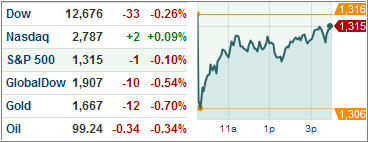Major market ETFs hovered near the zero mark once again as Greece remains in a deadlock with its creditors. The S&P 500 marginally dipped 0.10% while European indices were down as well.
Also, the Euro stood still at $1.30/Euro while the 10-year Treasury was virtually unchanged at 2.06%. Overall, the last couple weeks have presented an entry point to gain selective equity ETF exposure but markets haven’t moved significantly since.
While Eurozone risks still guide our low risk strategy, other investors seem to be regaining some of their appetite. The VIX has now broken under 20, showing that volatility has substantially subsided in the last month. Nevertheless, the grander picture of a strained global economy suggests market volatility can ramp back up.
Undoubtedly, the major focus right now is on Greece. European finance ministers are pushing for bondholders to accept lower interest rates on new Greek bonds. Bondholders want a generous interest rate on new bonds in exchange for a taking a large haircut on pre-existing debt, but this won’t help Greece reduce its debt load or address its fiscal woes.
Even the ECB is caught in the mess as the IMF has suggested that the ECB take a loss on its Greek bond holdings, which are over $50 billion. I’m afraid the possibility of default might be arriving soon with this level of disagreement.
Looking at bond markets, while Italy’s 10-year bonds are below 7%, they went up to 6.16%, still somewhat unnerving given Italy’s debt mess. Meanwhile, comparable German and French bonds also rose. A Greek default could quickly trigger skyrocketing yields across the Eurozone periphery and core.
With the Fed decision’s to now publicly disclose its interest rate forecasts, tomorrow’s announcement of the Federal Open Market Committee’s projections should offer some insight as to the status of QE3. This increase in transparency can help ease markets by building in more certain expectations.
Not to mention, President Obama’s State of the Union is tonight, so it will be interesting to see if he has a credible economic plan that inspire some confidence in markets. However, I doubt whether hopeful rhetoric can alter the difficult economic reality we’re facing.
At the end of the day, I’m pessimistic about Greece’s ability to avoid default and believe it should leave the Eurozone before chaos ensues. In the meantime, make sure you implement trailing stop losses in case markets suffer a big drop.
Contact Ulli

Comments 1
ulli,
why would any sane person buy greek bonds at all, rather than argue about the interest rate? there have to be better places for money than greek bonds. geez.